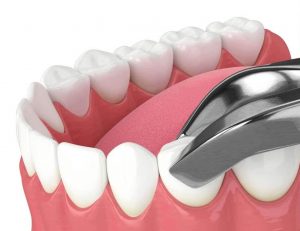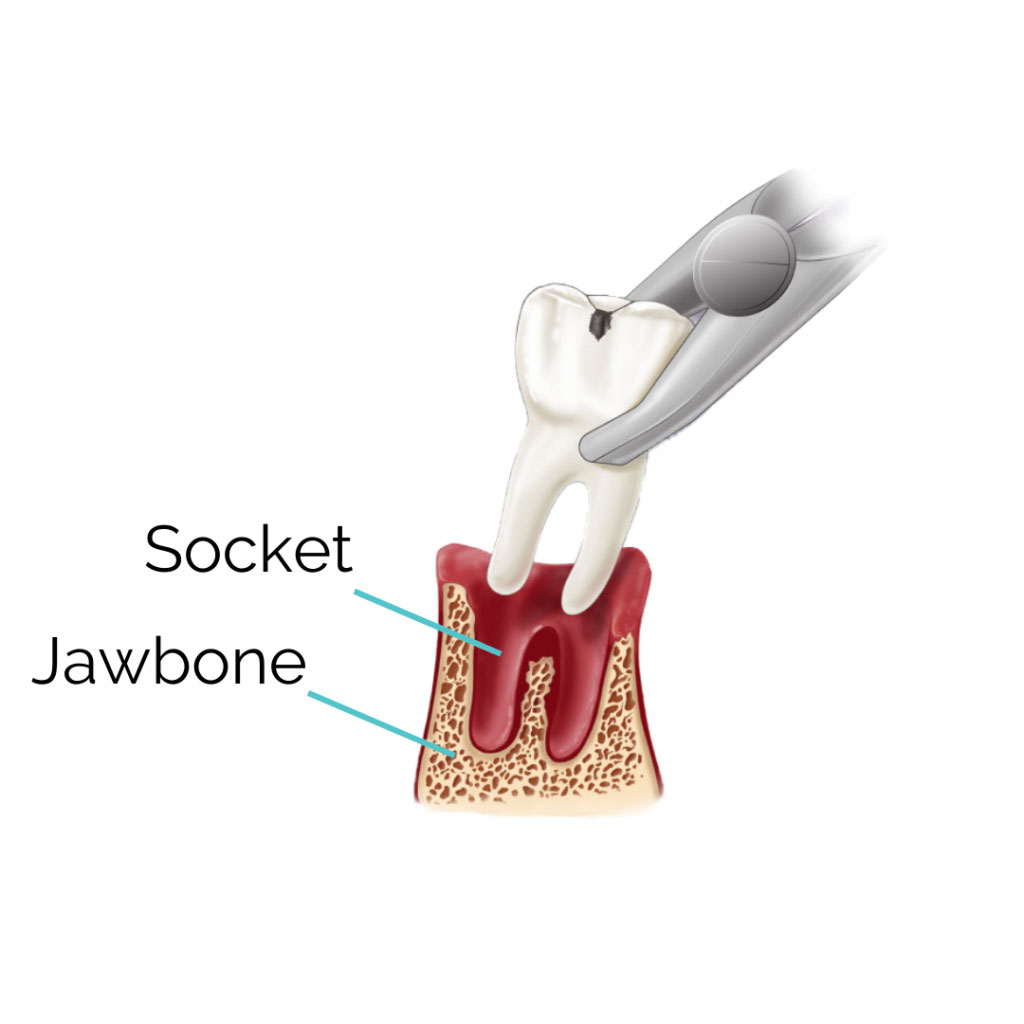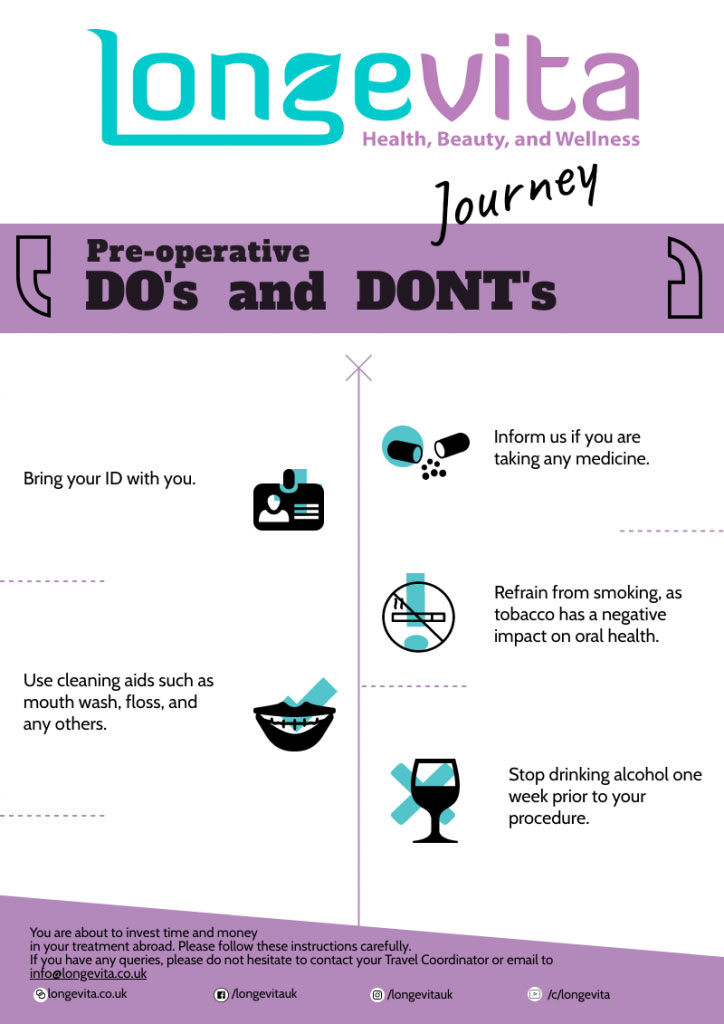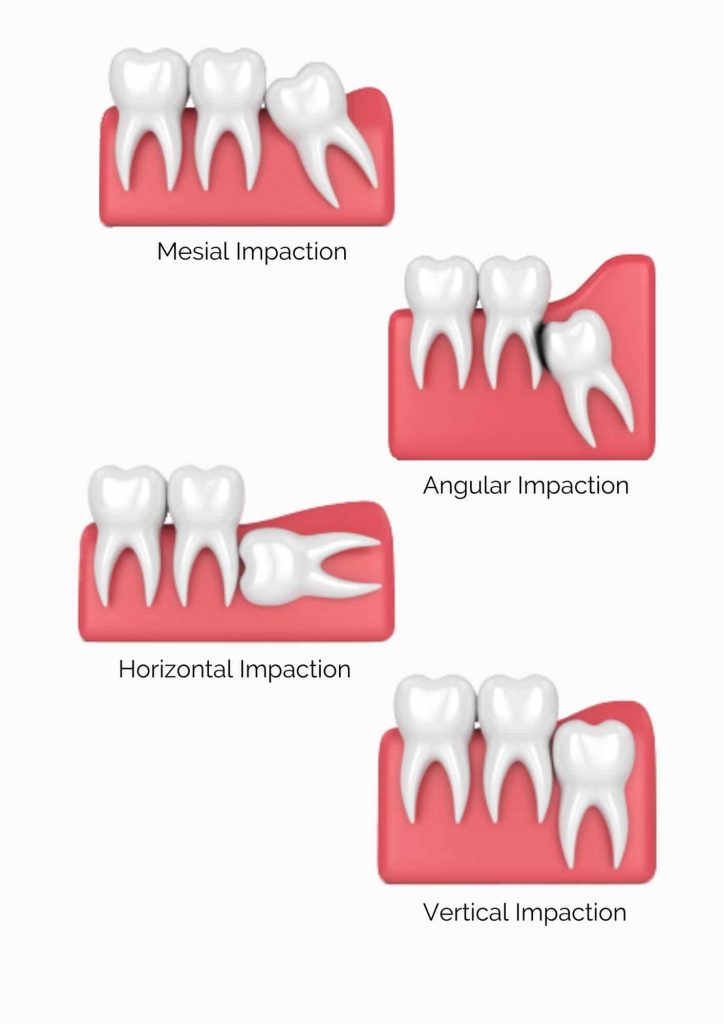Tooth extraction is a dental procedure in which one or more teeth are removed from the mouth.
Extraction becomes necessary when the tooth is badly damaged or decayed and cannot be saved with fillings or crowns.
What is Tooth Extraction?
Tooth removal is an outpatient procedure in which the surgeon removes the tooth that has undergone extensive decay. The procedure is irreversible, done manually using forceps.
Usually, it’s best to get a tooth extracted before it causes too much discomfort.
Therefore, if you experience severe physical trauma, you may need an emergency tooth extraction within 1-2 days.

What Is The Cost Of Tooth Extraction In Turkey?
In Turkey, tooth extraction costs around £50-£100.
It is 3-5 times less than in the UK or the US. The currency exchange rate and cost of living are a few reasons why.
However, the boom in medical tourism in Turkey is another reason why foreigners find more affordable treatments here.
The price of tooth extraction in the UK can have huge variations depending on the area where you live, the surgeon, the medical facility, and the complexity of the surgery.
Clinics in Turkey’s competitive healthcare market have an average price in their area.
They offer not only surgery and anaesthesia, but also accommodation, transfer, and aftercare.
Who Can Have A Tooth Extraction & Why?
You are a suitable candidate for tooth removal in the following cases:
Damaged Tooth
If your tooth is severely decayed, broken, or diseased, the surgeon may recommend getting rid of it altogether as it may cause more damage.
The infection can spread to the surrounding tissue and teeth and even affect distant organs.
Overcrowding
Getting orthodontic treatment may require tooth removal to make room for the teeth as they move back for a better alignment.
Another case in which extraction may be necessary is that you have a tooth that wants to come out but can’t because there’s no space for it.
Infection
If the pulp of the tooth is infected, a root canal treatment is usually the recommended treatment option, but if it’s too far gone and the antibiotics or root canal are not enough, extraction may be the only option available.
This is also the case if an abscess has formed. In the case of gum infection too, when the tooth becomes loose, removal may be recommended.
Another situation in which extraction may be necessary is when the immune system of a person is compromised.
Impacted Wisdom Teeth
Growing at odd angles, these teeth do not have enough room to come out. Even if you’re not experiencing any problems with them, there’s a high chance of such teeth getting decayed.
Not just that, but they can also impact the teeth in the front. Moreover, you can develop cysts around impacted wisdom teeth. So, if you have one, your dentist may recommend a wisdom tooth extraction.
Am I Suitable For Tooth Extraction?
What To Think About Before You Have Tooth Extraction In Turkey?
When getting a tooth removal surgery, you need to ask the dental surgeon about their qualifications and experience.
Additionally, knowing that they have liability insurance can also help you in making an informed decision.
You should also ask about the registration of the clinic and the licensing of the surgeon.
Other than that, ask about the procedure of tooth extraction, the required downtimes, aftercare and follow-up.
You should also learn about alternative treatment options if they’re possible.

How Best To Prepare For Tooth Extraction?
Before coming in for the tooth removal procedure, it is important that you inform the doctor about your health condition.
If you have a disease that compromises the functioning of your immune system, you may be asked to take an antibiotic before and after the surgery.
A heart or liver problem may also require the same.
Other than that, do not smoke, and make sure to brush your teeth before coming in for the appointment.

What Is The Procedure For Tooth Extraction In Turkey?

These are of two types, which are as follows:
Simple Tooth Extraction
Once you’re at the clinic, the dentist will begin by performing a physical exam.
An X-ray might be needed so that the dentist can determine the health of your mouth. Afterwards, you’re going to be given local anaesthesia.
Once the anaesthesia has taken effect, the tooth removal procedure begins with the dentist loosening the tooth using an elevator.
Forceps are then used to pull the tooth out. While this happens, you should not feel any pain, although you might feel some pressure. Your dentist can extract multiple teeth in one visit.
After the extraction, the dentist will clean the socket. It is possible that you might get dissolvable stitches in the surgical area.
They’ll go away after 7-10 days. The dentist will also put gauze in place to stop the bleeding.
Surgical Tooth Extraction
In the case of an impacted wisdom tooth, surgical tooth extraction is likely to take place. Following assessment, the dentist will begin by injecting the anaesthesia.
Here, sedation for tooth extraction is also possible if you’re feeling anxious about the surgery. It will help you relax and can even make you fall asleep during the procedure.
In the surgical tooth extraction procedure, the surgeon will cut the gum and pull it away to expose the tooth. They may have to cut some of the bone around. Again, forceps pull the tooth out.
However, if the tooth is too hard to pull out, the dentist may break it down into smaller pieces for easier extraction.
Book A Free Consultation With Our Patient Consultants
We offer free consultations for patients across the UK & Ireland, so you can discuss your individual requirements with our specialists. Book A Free Consultation With Our Patient Consultants Today.
Recovery & Results Of Tooth Extraction
Tooth extraction has minimal downtime. Once you leave the clinic, you’ll have the gauze in place.
If the bleeding continues, your dentist may recommend replacing it after 30-45 minutes with a fresh, damp one.
Tooth extraction recovery can take anywhere from 1 to 2 weeks.
However, after extraction, a blood clot will form in the socket, and the bone will fill in. This process can take months.
During the tooth extraction healing, it’s important that you take your painkillers as prescribed by your dentist. Ask them if you need to take antibiotics as well.
For the swelling, your doctor may recommend using an ice bag.
Aftercare Of Tooth Extraction
It’s important that you brush and floss your teeth as a part of tooth extraction aftercare the day after the surgery.
However, you need to avoid brushing the healing socket for at least 3 days.
When you rinse the mouth, do it very gently. You may be advised about using salt-water rinses 3-4 times a day.
In addition, you need to avoid smoking for 48 hours after tooth removal. Alcohol is also a no-go if you’re taking antibiotics since it can interfere with it.
In order to avoid applying undue force on the healing socket, do not use a straw or spit forcefully.
It’s best if you completely rest a day after the surgery and do not perform any physical activity.
What to Eat After Tooth Extraction?
Your dentist will advise you about the kind of foods that you should eat after tooth extraction. While your mouth is still numb, it’s okay for you to eat:
- Applesauce
- Pudding
- Yoghurt
- Water
- Juice
- Milkshake
- Popsicles
And once the numbness is gone, you can eat the following foods:
- Mashed potatoes
- Pasta
- Eggs
- Pancakes
- Creamed cereals
- Not-to-hot soups
You should not eat any kind of crunchy food for at least 1 week.
Side Effects to Expect After A Tooth Extraction
The following are the side effects of the tooth removal procedure:
Numbness: It is common to experience numbness after tooth extraction. It may be around the mouth area extending to the cheeks. This should go away in a few hours.
Bleeding: Bleeding after a tooth extraction is expected. It should be light and normally lasts for a day along with swelling.
However, if it’s getting worse, you should get in touch with the doctor.
Pain: Pain after a tooth extraction is also expected and can last for 5-7 days after the surgery. For some people, it gets worse around the 3rd day, after which it starts getting better. Painkillers help with it.
However, if you have throbbing pain after tooth extraction, it may be due to an infection or dry socket, in which case you should contact your dentist.
Jaw Pain: It can happen because of the proximity of the muscles to the surgical site. Your jaw may feel stiff for 7-10 days.
Sensitivity: The tooth close to the surgical site may become sensitive for a few weeks after the surgery.
What Could Go Wrong After A Tooth Extraction?
It’s possible for the following complications to arise after a tooth removal procedure:
Dry Socket: Having an incidence rate of 2-5%, dry sockets can develop due to different reasons, such as smoking, infection or trauma.
It occurs because the clot that was covering the socket got dislodged. It can result in severe pain and bad breath. You need to get in touch with the dentist immediately.
Infection: It’s a possible complication of every surgery. Bacteria from the mouth can enter the socket and into the body, causing an infection.
Rarely, the bone can develop an infection after tooth extraction. This is known as osteomyelitis.
It could also be a gum infection after tooth extraction. Keep a lookout for the following signs:
- Sensitivity
- Bad breath
- Swelling
- Redness
- Fever
- Bad taste in the mouth
- Discharge
- Worsening pain
Nerve Injury: Very rarely, this surgery can damage the nerves in the treated area. Some people get the pins and needles feeling while others experience numbness.
This should go away in a few weeks to months. However, if it persists longer than that, the damage may be permanent. In any case, make sure to get help.
What To Do If You Have Problems After Tooth Extraction In Turkey?
Although the surgery is safe, especially in the hands of an experienced, licensed dental surgeon, you can experience some problems during the recovery.
If that happens, you can refer to the Aftercare team online. They will get a medical assessment from your surgeon.
In addition, you can get help from the guides available in the Support Portal and open a ticket there.
Alternatives To Tooth Extraction
There is one alternative to dental extraction. Your surgeon may recommend root canal therapy instead if it’s possible to save the tooth.
That’s because a root canal is more conservative and doesn’t require follow-up dental surgeries, like the need for implants after extraction.
Other Procedures to Have with Tooth Extraction
Many dental procedures can be combined with tooth extraction. If you do not have an infection around the extracted teeth, crowns, veneers, and implants may be placed during the same appointment.
They will help prevent bone loss and ensure that your bite is not altered.
FAQ
How long does a tooth extraction take to heal?
From the surgery, you should recover in 2 days. The empty socket fills up in 1 month or so, but the bone inside can take 4 months to heal.
Does tooth extraction hurt?
Local anaesthesia is administered so that you do not feel any pain during the extraction. At most, you’ll feel some pressure. After the surgery, you’re going to feel some pain which is managed with painkillers.
Is extraction of a broken tooth possible?
Yes, it is possible to extract a tooth that’s broken beyond repair. It is better to have the treatment as soon as possible to avoid further complications.
When can I eat after tooth extraction?
You can start eating after the surgery. However, your dentist may recommend eating from the other side of the mouth (consult them on this). Eat the foods they recommend.
Can I use mouthwash after tooth extraction?
You should not use mouthwash for the first few days after the tooth removal. That’s because it can dislodge the clot. Even when you’re rinsing your mouth, do it very gently.
Does wisdom tooth extraction change the shape of the face?
The swelling following the surgery can make your face look a little different for 1 day. However, tooth extraction does not change the shape of your face in any way.
It may be a possibility if a lot of teeth have been removed, giving you a sunken appearance.
Reviewed and approved by Dr. Izbel Aksit.